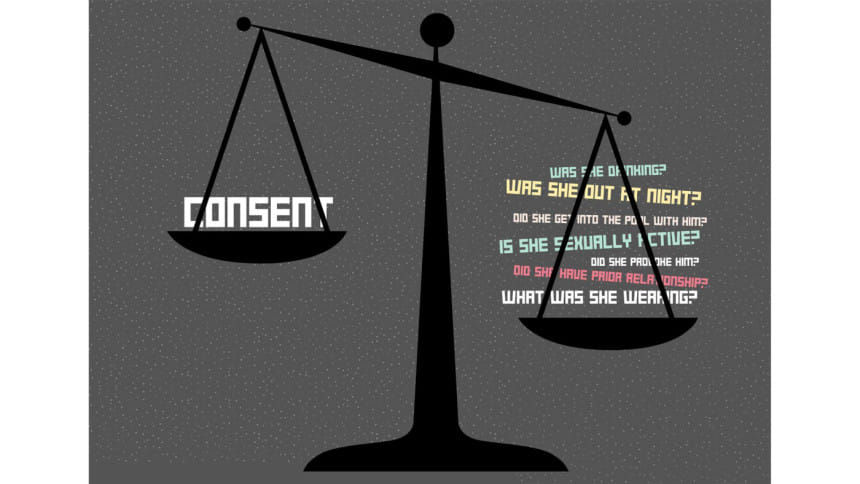Why are rape victims still put on trial?

The rape culture in Bangladesh is nurtured by many disappointing legal loopholes. Some of the provisions are so self-defeating and irrational in nature that not only do they fail to ensure justice to the victims, but they also put the victims on trial, rather than the perpetrators. Despite countless demonstrations, protests and articles which surely make us sound like broken records at this point, the political will of the government never follows through to scrap these provisions.
Two such notorious legal provisions are sections 155 (4) and 146 (3) of the colonial-era Evidence Act, 1872.
Section 155 (4) allows the defence to show that the victim is of "generally immoral character." By virtue of this section, defence may produce a witness to give evidence along the lines of why the victim should not be believed. Similarly, Section 146 (3) allows a witness to be asked such questions that dent her credibility.
In November 2021, a writ petition was filed challenging the legality of these two archaic sections. These provisions are completely against a rape victim's fundamental rights and are devoid of any logic whatsoever, because it should be the perpetrator on the stand being judged—not the victim.
The adverse effect of these provisions is extremely far-reaching—not just on each rape trial, but also on our societal fabric as a whole. When a piece of law passed and endorsed by the most supreme body in the entire state permits a victim's character to be dragged through the mud during her own rape trial, it passively gives everyone the right to do the same even outside the courtroom. These sections allow the defence to discredit the victim's character, while at the same time enabling the Everyman of our country to ask: Well, what was she wearing? Why was she out so late at night? And if the victim is found to have been wearing something or behaving in a way which is outside the conventionally accepted standards of modesty, people are allowed to draw the conclusion that she herself is to be blamed for her rape. No civilised legal system in this day and age would allow such line of questioning, because it is damaging to the trial, the victim's psyche and the community of rape survivors.
The domino effect of these provisions seeps into every interaction a victim has, starting from those with the law enforcement to the general public. On December 23, a gang of young men raped a woman who was collecting funds from tourists with her husband in Cox's Bazar, for the treatment of their child suffering from heart disease. The incident ensued when the perpetrators failed to extort money from the family. They abducted the woman and raped her while holding her husband and eight-month-old child hostage. The intrinsically violent and deliberately misogynistic nature of this crime is horrifying beyond comprehension, but the moral decay of men in our society is a conversation for another day. For now, let's see how the police are running the investigation for this heinous crime that has permanently scarred a family.
While the matter is under investigation, police initially chose to label the perpetrators as being "formerly known" to the victim. The same trajectory was also adopted during the trial of the Raintree Hotel rape case (2017) and Kalabagan student rape case (2021), both of which were (in)famously ripe with victim-blaming.
A rape victim's past sexual history is in no way relevant to whether she had given consent to the particular sexual activity in question. Instances of previous acquaintance discredit a victim's character and insinuate that she might have consented to the sexual activity in question, which is extremely harmful to the case and completely defeats the purpose of a rape trial. If such insinuations regarding a victim's character are valid, then it must also mean that prostitutes and sex workers by default have given consent to literally everyone at large and therefore can never be raped, which is an irrational conclusion. Similarly, this line of investigation fails to consider that most victims are not raped by complete strangers, but rather their acquaintances.
Criminal law fascinatingly adopts a bird's eye view while judging a situation. Very often, a statute would expressly guide the courts to "take all circumstances into consideration" before they reach a particular conclusion. An interesting deviation from this general rule of thumb appears in cases of sexual offences in many jurisdictions. For example, Section 41 of the Youth Justice and Criminal Evidence Act, 1999 of England restricts all evidences and questioning about the complainant's sexual history in sexual offence trials—hence making the lens for judgment very narrow and considering only what is relevant, such as whether the complainant had given consent during only the particular sexual activity in question.
On the contrary, Section 155 (4) of our Evidence Act uses arbitrary terminology such as "generally immoral character" without defining how such immorality is to be construed. This provision was enacted nearly 150 years ago. A woman speaking out of turn could potentially have been interpreted as having an immoral character back then. How do we interpret this century-old provision now? Who dictates the parameters of morality for women? Would staying out past 10 o'clock at night be considered as a woman's immoral characteristic in 2022? Would being raped while she was out wearing a sleeveless salwar kameez harm her chances of getting justice? What exactly is the purpose of this nonsensical provision, which in no way helps the court decide upon the accused's guilt?
To demonstrate just how backwards and inherently harmful to fairness these two sections are, we can take the Sexual Offences Act, 2003 of England and Wales as an example. Section 74 of it states, "A person consents if he/she agrees by choice, and has the freedom and capacity to make that choice." On top of this triple-layer safety net (requiring the victim to have the choice, freedom and capacity to agree to engage in sexual activity before they can be said to have consented), the act also requires that the defendant has had "reasonable belief" that the victim consented to the activity. To prove reasonable belief, the court asks both a subjective question and an objective question. First, did the defendant believe that the victim was consenting? Second, if he so believed, then was the belief reasonable?
This is how a modern piece of sexual offence law addresses the nuances of consent. England's 2003 law denounces the patriarchal whims of their own colonial era statute, which we are still fostering 74 years after being decolonised. On top of our shockingly outdated provisions of the Evidence Act, 1872, consent has not been defined anywhere in our entire legal glossary. This lacuna leads to the judges interpreting consent in whichever way they deem fit, with no statutory guidance, regardless of whether the victim in question is a romantic partner of the perpetrator or a stranger to a violent aggressor.
India, our colonised counterpart with similar societal structure and legal system, has made significant reforms—at least on paper, if not in practice—with regards to these archaic provisions. By introducing Section 53 (A) into the legislation, India has made character evidence inadmissible and has prescribed any question regarding a victim's character and past sexual history "irrelevant." They have also entirely repealed the controversial Section 155 (4). These amendments were being discussed at least since the late 1970s in India, four decades prior to when Bangladeshi women would still be protesting in front of the parliament building with placards, demanding justice. In that light, the irony of the regular Bangladeshis sitting on their high horse whenever India deals with widespread sexual offences should not be lost on anyone.
Patriarchy is all-consuming and intends to assume rights over women's bodies. Why isn't our parliament doing the bare minimum to side with women? The fact that we are still judging the women of this country through a 150-year-old lens is alarming—more so when they should not even be on trial.
Laws are "sentient" and a reflection of our collective consciousness. They are supposed to mirror the changing times and the shift in our moral codes. What is the point of the government preaching about equality for women, if the same is not reflected in the laws? A century and a half should be long enough for two unreasonable legal provisions to be cancelled, and the fact that the state has failed to do so—despite our many passionate appeals—shows just how little it cares about the horrifying lived experiences of women in this country, and how dysfunctional our legislature is.
Anupoma Joyeeta Joyee is a barrister-at-law.

 For all latest news, follow The Daily Star's Google News channel.
For all latest news, follow The Daily Star's Google News channel. 



Comments